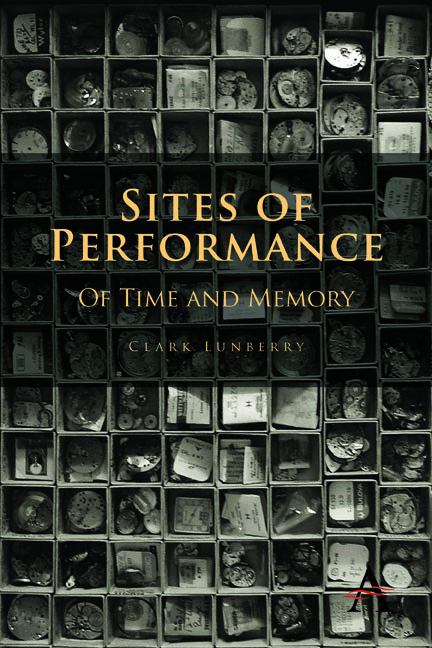Book contents
- Frontmatter
- Dedication
- Contents
- Acknowledgements
- Preface
- I Stagings: Plays of Space
- II Sightings: Sites of Time
- Chapter 5 Antonin Artaud's Unending Death Rattle
- Chapter 6 Writing upon Theaters of Tragic Thought
- Chapter 7 Figures of Speech: Ann Hamilton's Installations of Absence
- Chapter 8 Illuminated Theater: The Stages of James Turrell
- Chapter 9 Suspicious Silence: Walking Out on John Cage
- Chapter 10 In Living Memory: Morton Feldman's Departing Landscapes
- Postscript Seeing in Plain Sight—Installations in Flight
- Bibliography
- Index
Chapter 5 - Antonin Artaud's Unending Death Rattle
from II - Sightings: Sites of Time
Published online by Cambridge University Press: 05 November 2014
- Frontmatter
- Dedication
- Contents
- Acknowledgements
- Preface
- I Stagings: Plays of Space
- II Sightings: Sites of Time
- Chapter 5 Antonin Artaud's Unending Death Rattle
- Chapter 6 Writing upon Theaters of Tragic Thought
- Chapter 7 Figures of Speech: Ann Hamilton's Installations of Absence
- Chapter 8 Illuminated Theater: The Stages of James Turrell
- Chapter 9 Suspicious Silence: Walking Out on John Cage
- Chapter 10 In Living Memory: Morton Feldman's Departing Landscapes
- Postscript Seeing in Plain Sight—Installations in Flight
- Bibliography
- Index
Summary
Sa signature aussi me regarde. Est-ce possible?
—Jacques Derrida, SignépongeI have wounds to show you, which shall be yours in private
—William Shakespeare, CoriolanusAntonin Artaud was discussed in the final chapter of section one alongside Shakespeare's tragic warrior Coriolanus. Both were conjoined in their shared resistance to and rejection of the theatrical prompter, a figure perceived by each as a cause of corruption to one's sovereign voice, a violation of one's singular standing. However, it would be Derrida who, in his early essays on Artaud, in Writing and Difference, theoretically outlined the fatal dimensions of such resistances to being spoken for, and how, in the rejection of the prompter, there was uncovered, beneath it all, further layers of further promptings. Like those of an onion, these layers, too, seem in their unpeeling finally to expose at their core only a seed of further representation, as the singular is now split and divided, made multiple.
In what follows, we will again see Artaud struggling to locate a performative space in which he might still singularly affirm himself, a stage upon which to tell his own story. However, what develops in Artaud's early search is a dramatic engagement that does not occur on a theatrical stage, but in a more private space that either precedes or exceeds theatrical display.
- Type
- Chapter
- Information
- Sites of PerformanceOf Time and Memory, pp. 63 - 76Publisher: Anthem PressPrint publication year: 2014



